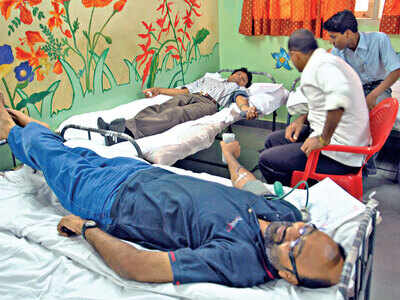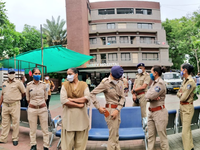Donations down by 58% since lockdown, blood banks in Gujarat run dry

Data reveals that against 60,847 units of blood collected last year, only 36,407 units were collected this year
The State is facing such critical shortage that it has been forced to get blood from neighbouring states, mainly Maharashtra , reveal Red Cross officials
» Krishnanagar resident Chirag Sharma had no idea that it would take him 4-5 hours to arrange for two bottles of blood after his father slipped in the bathroom, broke his femur, and bled out around 15 days ago
» Chandkheda resident Shailesh Parmar’s friend met with an accident inBapunagar about 20 days ago. Though they were ready to replace the blood, he still faced a tough time getting the correct type of blood
These are just two of the reasons why there’s a dire need for Amdavadis to donate blood. While the city is battling to get the post-Diwali Covid-19 surge under control, it’s also facing another medical emergency:severe blood shortage . In fact, this situation holds true for whole of Gujarat . Blood collections have dropped by as much as 58 per cent since lockdown due to implementation of social distancing, cancellation blood drives, and low donor turnout due to fears associated with catching infection from public places such as hospitals and blood banks. The State is facing such critical shortage that it has been forced to get blood from neighbouring states, mainly Maharashtra.
Data from Red Cross reveals that against 60,847 units of blood collected from January to December last year, only 36,407 units have been collected this year so far. The lockdown really hit blood collection as 46,422 units were collected between April and December last year but only 19,702 units were collected in the same period this year. This is a 58% drop in blood collection.
Dr Kiran Chudgar, chairman of Ahmedabad Red Cross Society, says, “We experienced blood shortage during the lockdown, but the shortage we are experiencing now is unusual. If this continues, then a patient who is undergoing operation might not get blood on time. This can become a huge problem.”
He reveals, “Even if you consider the period from January to December, there is a fall of 40.17 per cent in blood collection. This disruption has impacted availability of blood for emergency surgeries, post-partum haemorrhage cases, thalassaemia, haemophilia, sickle-cell and cancer patients. So, we now seek replacement of blood from those who come to collect blood.”
Physician Pravin Garg, who has been looking afterCovid patients who are home quarantined, says, “Patients who have recovered from Covid can donate blood and plasma after 28 days. However, people do not do so due to various misconceptions. They think that going to donation camps or hospitals can lead to spread of coronavirus. People also think that they might get infected through blood transfusion. These are just myths. There’s no evidence so far that coronavirus spreads through transfusions. Due to this fear, people are turning away from donating blood and plasma. However, the situation is dire and there’s an urgent need for citizens to come forward and donate blood.”
There’s an increased need for blood in the entire State, says Jaswant Prajapati, COO of EMRI 108 ambulance service. “During lockdown, there were very few people on the roads. But now, people are involved in vehicular accidents. There are also non-vehicular traumas like falling off roofs and stairs, assault, and complicated pregnancies where blood is needed. Since such cases are on the rise, people are facing shortage of blood. The government needs to build more awareness on the compliance of safety protocols being followed by all blood banks and collection centres to instill confidence in public on voluntary blood donation in these uncertain times. Industries, corporates and social organisations need to approach people, make them aware of the immediate need to donate blood.”
Prakash Parmar, general secretary ofIndian Red Cross Society , says, “We have patients of thalassaemia, haemophila, and sickle cell registered with us. We had trouble arranging blood for them. We even had to get blood from Maharashtra due to shortage here. Now, the shortage has just got worse as people are no longer coming forward to give blood. We need to tide over this issue or the situation is really going to be worse.”
» Krishnanagar resident Chirag Sharma had no idea that it would take him 4-5 hours to arrange for two bottles of blood after his father slipped in the bathroom, broke his femur, and bled out around 15 days ago
» Chandkheda resident Shailesh Parmar’s friend met with an accident in
These are just two of the reasons why there’s a dire need for Amdavadis to donate blood. While the city is battling to get the post-Diwali Covid-19 surge under control, it’s also facing another medical emergency:
There is fall of 40.17% in blood collection this year. So, we now seek replacement from those who come to us to collect blood for their kin or friends
Data from Red Cross reveals that against 60,847 units of blood collected from January to December last year, only 36,407 units have been collected this year so far. The lockdown really hit blood collection as 46,422 units were collected between April and December last year but only 19,702 units were collected in the same period this year. This is a 58% drop in blood collection.
We have patients of thalassaemia, haemophila, and sickle cell registered with us. We had to get blood from Maharashtra for them
Dr Kiran Chudgar, chairman of Ahmedabad Red Cross Society, says, “We experienced blood shortage during the lockdown, but the shortage we are experiencing now is unusual. If this continues, then a patient who is undergoing operation might not get blood on time. This can become a huge problem.”
Govt needs to build awareness on safety protocols followed by blood banks and collection centres to instill confidence in public
He reveals, “Even if you consider the period from January to December, there is a fall of 40.17 per cent in blood collection. This disruption has impacted availability of blood for emergency surgeries, post-partum haemorrhage cases, thalassaemia, haemophilia, sickle-cell and cancer patients. So, we now seek replacement of blood from those who come to collect blood.”
Physician Pravin Garg, who has been looking after
There’s an increased need for blood in the entire State, says Jaswant Prajapati, COO of EMRI 108 ambulance service. “During lockdown, there were very few people on the roads. But now, people are involved in vehicular accidents. There are also non-vehicular traumas like falling off roofs and stairs, assault, and complicated pregnancies where blood is needed. Since such cases are on the rise, people are facing shortage of blood. The government needs to build more awareness on the compliance of safety protocols being followed by all blood banks and collection centres to instill confidence in public on voluntary blood donation in these uncertain times. Industries, corporates and social organisations need to approach people, make them aware of the immediate need to donate blood.”
Prakash Parmar, general secretary of
GALLERIES View more photos




























Recent Messages ()
Please rate before posting your Review
SIGN IN WITH
Refrain from posting comments that are obscene, defamatory or inflammatory, and do not indulge in personal attacks, name calling or inciting hatred against any community. Help us delete comments that do not follow these guidelines by marking them offensive. Let's work together to keep the conversation civil.